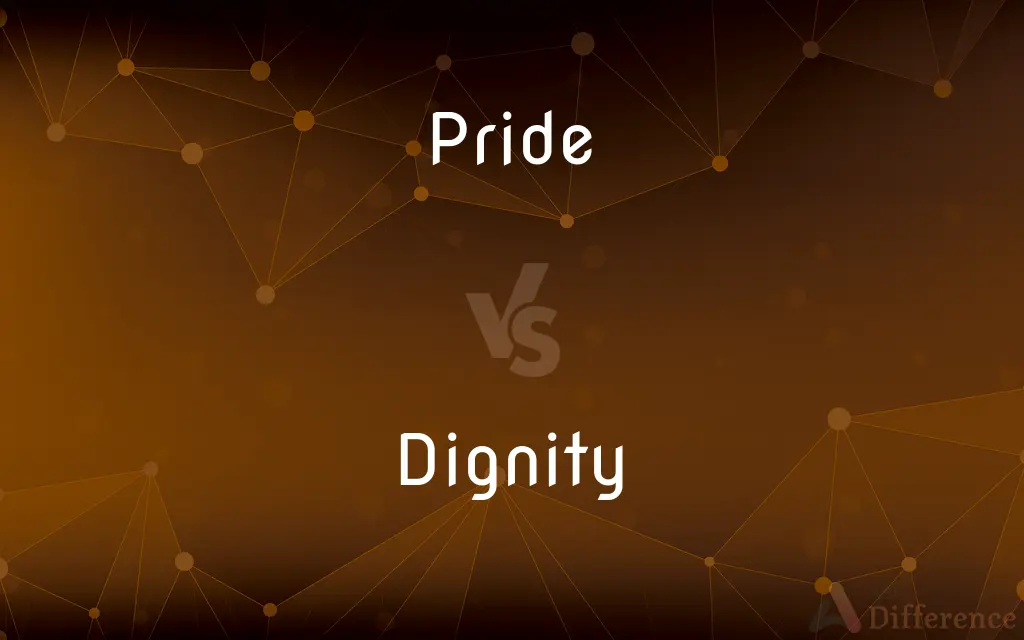Pride vs. Dignity — What's the Difference?
By Urooj Arif & Maham Liaqat — Updated on March 14, 2024
Pride is a feeling of self-respect and personal worth, often associated with achievements, while dignity is an inherent sense of value and respect, independent of accomplishments.

Difference Between Pride and Dignity
Table of Contents
ADVERTISEMENT
Key Differences
Pride is an emotional state that stems from one's achievements, qualities, or possessions, which are viewed positively by oneself and, often, by others. It reflects a sense of satisfaction and self-respect derived from one's accomplishments or the accomplishments of those with whom one identifies. Conversely, dignity refers to the inherent worth and respect that every individual possesses, regardless of their status, achievements, or failures. It is a fundamental concept that underpins the idea that all humans deserve respect and ethical treatment simply by virtue of being human.
While pride can vary in intensity and can sometimes be perceived negatively when it crosses into arrogance, dignity is considered a stable and unalienable aspect of human rights. Pride is subjective and can be influenced by external validation and personal standards, whereas dignity is objective, recognizing the inherent value in every person. This distinction highlights how one's achievements can affect their sense of pride but not their inherent dignity, which remains constant.
Pride often requires external acknowledgment or comparison to others to be felt or expressed, as it is closely tied to social status, achievements, and recognition. Dignity, on the other hand, does not depend on external circumstances or comparisons. It is an internal and universal attribute that does not require validation from others to exist. This fundamental difference underscores the conditional nature of pride versus the unconditional nature of dignity.
The cultivation and expression of pride and dignity also differ. Pride is cultivated through personal or communal achievements and is often expressed through celebration, recognition, and sometimes, competition. Dignity, however, is nurtured through recognizing and respecting the inherent worth of oneself and others. It is expressed through actions and behaviors that uphold human rights, equality, and respect for all individuals.
In terms of social and ethical implications, pride and dignity serve different roles. Pride can motivate individuals to achieve and excel, fostering personal growth and community development. However, unchecked pride can lead to divisiveness and conflict. Dignity plays a crucial role in social justice and human rights, advocating for the equal and ethical treatment of all individuals, regardless of their achievements or social status. It emphasizes the importance of empathy, respect, and ethical treatment in all human interactions.
ADVERTISEMENT
Comparison Chart
Definition
Self-respect from achievements.
Inherent value and respect for all individuals.
Dependency
On achievements, social status.
Inherent, regardless of status or achievements.
Perception
Can vary, sometimes seen as negative.
Generally viewed as positive and stable.
Cultivation
Through personal or communal achievements.
Through recognizing inherent worth in all.
Expression
Celebration, recognition, sometimes competition.
Actions that uphold equality, respect, and human rights.
Social Implications
Motivates achievement but can lead to divisiveness.
Advocates for equal and ethical treatment of all individuals.
Compare with Definitions
Pride
Varies with accomplishments.
His pride in his artwork grew as he received more recognition.
Dignity
Inherent worth and respect for individuals.
Every person deserves to be treated with dignity, regardless of their circumstances.
Pride
Expressed through celebration of achievements.
The award ceremony was a moment of pride for the entire school.
Dignity
Nurtured by respecting oneself and others.
She upheld her dignity by standing up for her principles.
Pride
Can lead to arrogance if unchecked.
His pride in his intellect sometimes bordered on arrogance.
Dignity
Advocates for empathy and respect in interactions.
The teacher emphasized the importance of treating all students with dignity.
Pride
Feeling based on personal worth and achievements.
She felt a deep sense of pride after winning the championship.
Dignity
Unconditional and stable.
Despite losing his job, he maintained his dignity.
Pride
Cultivated through recognition and success.
Community pride flourished after the local team's victory.
Dignity
High office or rank or station;
He respected the dignity of the emissaries
Pride
Pride is positive emotional response or attitude to something with an intimate connection to oneself, due to its perceived value. Oxford defines it amongst other things as "the quality of having an excessively high opinion of oneself or one's own importance" This may be related to one's own abilities or achievements, positive characteristics of friends or family, or one's country.
Dignity
Expressed in ethical treatment and equality.
Human rights organizations fight to protect the dignity of vulnerable populations.
Pride
A sense of one's own proper dignity or value; self-respect.
Dignity
Dignity is the right of a person to be valued and respected for their own sake, and to be treated ethically. It is of significance in morality, ethics, law and politics as an extension of the Enlightenment-era concepts of inherent, inalienable rights.
Pride
Pleasure or satisfaction taken in an achievement, possession, or association
Parental pride.
Dignity
The state or quality of being worthy of honour or respect
The dignity of labour
Pride
Arrogant or disdainful conduct or treatment; haughtiness.
Dignity
A composed or serious manner or style
He bowed with great dignity
Pride
A cause or source of pleasure or satisfaction; the best of a group or class
These soldiers were their country's pride.
Dignity
The quality or state of being worthy of esteem or respect.
Pride
The most successful or thriving condition; prime
The pride of youth.
Dignity
Inherent nobility and worth
The dignity of honest labor.
Pride
An excessively high opinion of oneself; conceit.
Dignity
Poise and self-respect.
Pride
Mettle or spirit in horses.
Dignity
Stateliness and formality in manner and appearance.
Pride
A flamboyant or impressive group
A pride of acrobats.
Dignity
The respect and honor associated with an important position.
Pride
To indulge (oneself) in a feeling of pleasure or satisfaction
I pride myself on this beautiful garden.
Dignity
A high office or rank.
Pride
The quality or state of being proud; an unreasonable overestimation of one's own superiority in terms of talents, looks, wealth, importance etc., which manifests itself in lofty airs, distance, reserve and often contempt of others.
Dignity
Dignities The ceremonial symbols and observances attached to high office.
Pride
A sense of one's own worth, and scorn for what is beneath or unworthy of oneself; lofty self-respect; noble self-esteem; elevation of character; dignified bearing; rejection of shame
He took pride in his work.
He had pride of ownership in his department.
Dignity
(Archaic) A dignitary.
Pride
Proud or disdainful behavior or treatment; insolence or arrogance of demeanor; haughty bearing and conduct; insolent exultation.
Dignity
The state of being dignified or worthy of esteem: elevation of mind or character.
Pride
That of which one is proud; that which excites boasting or self-congratulation; the occasion or ground of self-esteem, or of arrogant and presumptuous confidence, as beauty, ornament, noble character, children, etc.
Dignity
Decorum, formality, stateliness.
Pride
Show; ostentation; glory.
Dignity
High office, rank, or station.
Pride
Highest pitch; elevation reached; loftiness; prime; glory.
Dignity
One holding high rank; a dignitary.
Pride
Consciousness of power; fullness of animal spirits; mettle; wantonness.
Dignity
(obsolete) Fundamental principle; axiom; maxim.
Pride
(zoology) The small European lamprey species Petromyzon branchialis.
Dignity
(euphemistic) The male genitalia. en
Pride
(reflexive) To take or experience pride in something; to be proud of it.
I pride myself on being a good judge of character.
Dignity
The state of being worthy or honorable; elevation of mind or character; true worth; excellence.
Pride
A small European lamprey (Petromyzon branchialis); - called also prid, and sandpiper.
Dignity
Elevation; grandeur.
The dignity of this act was worth the audience of kings.
Pride
The quality or state of being proud; inordinate self-esteem; an unreasonable conceit of one's own superiority in talents, beauty, wealth, rank, etc., which manifests itself in lofty airs, distance, reserve, and often in contempt of others.
Those that walk in pride he is able to abase.
Pride that dines on vanity sups on contempt.
Dignity
Elevated rank; honorable station; high office, political or ecclesiastical; degree of excellence; preferment; exaltation.
And the king said, What honor and dignity hath been done to Mordecai for this?
Reuben, thou art my firstborn, . . . the excellency of dignity, and the excellency of power.
Pride
A sense of one's own worth, and abhorrence of what is beneath or unworthy of one; lofty self-respect; noble self-esteem; elevation of character; dignified bearing; proud delight; - in a good sense.
Thus to relieve the wretched was his pride.
A people which takes no pride in the noble achievements of remote ancestors will never achieve anything worthy to be remembered with pride by remote descendants.
Dignity
Quality suited to inspire respect or reverence; loftiness and grace; impressiveness; stateliness; - said of mien, manner, style, etc.
A letter written with singular energy and dignity of thought and language.
Pride
Proud or disdainful behavior or treatment; insolence or arrogance of demeanor; haughty bearing and conduct; insolent exultation; disdain.
Let not the foot of pride come against me.
That hardly we escaped the pride of France.
Dignity
One holding high rank; a dignitary.
These filthy dreamers . . . speak evil of dignities.
Pride
That of which one is proud; that which excites boasting or self-gratulation; the occasion or ground of self-esteem, or of arrogant and presumptuous confidence, as beauty, ornament, noble character, children, etc.
Lofty trees yclad with summer's pride.
I will cut off the pride of the Philistines.
A bold peasantry, their country's pride.
Dignity
Fundamental principle; axiom; maxim.
Sciences concluding from dignities, and principles known by themselves.
They did not stand upon their dignity, nor give their minds to being or to seeming as elegant and as fine as anybody else.
Pride
Show; ostentation; glory.
Pride, pomp, and circumstance of glorious war.
Dignity
The quality of being worthy of esteem or respect;
It was beneath his dignity to cheat
Showed his true dignity when under pressure
Pride
Highest pitch; elevation reached; loftiness; prime; glory; as, to be in the pride of one's life.
A falcon, towering in her pride of place.
Dignity
Formality in bearing and appearance;
He behaved with great dignity
Pride
To indulge in pride, or self-esteem; to rate highly; to plume; - used reflexively.
Pluming and priding himself in all his services.
Pride
To be proud; to glory.
Pride
A feeling of self-respect and personal worth
Pride
Satisfaction with your (or another's) achievements;
He takes pride in his son's success
Pride
The trait of being spurred on by a dislike of falling below your standards
Pride
A group of lions
Pride
Unreasonable and inordinate self-esteem (personified as one of the deadly sins)
Pride
Be proud of;
He prides himself on making it into law school
Common Curiosities
What is the main difference between pride and dignity?
Pride is a feeling related to achievements and self-respect, while dignity is the inherent worth and respect every individual holds, independent of accomplishments.
How do pride and dignity influence social behavior?
Pride can motivate achievements and foster community spirit but may also result in conflict. Dignity encourages respectful and ethical treatment of all individuals, promoting social harmony.
Is dignity dependent on external factors?
No, dignity is inherent and unconditional, not influenced by one's social status, achievements, or external validation.
Can pride negatively affect one's dignity?
Yes, excessive pride can lead to arrogance, potentially undermining one's dignity and the dignity of others by failing to recognize inherent worth equally.
Can a person have pride without dignity?
While a person can feel pride without exhibiting dignity, true self-respect, which is a component of pride, is closely aligned with recognizing one's own and others' inherent dignity.
How do cultures vary in their perception of pride and dignity?
Cultural perceptions of pride can vary, with some cultures valuing modesty, while others celebrate individual or communal achievements. However, the concept of dignity is universally recognized, though its expression may differ across cultures.
Can dignity be lost or taken away?
While external circumstances can challenge one's sense of dignity, it cannot truly be taken away as it is an inherent aspect of being human.
Why is dignity important in human rights?
Dignity is a foundational concept in human rights, advocating for the equal and ethical treatment of all individuals, emphasizing that every person deserves respect and fair treatment.
What are the social implications of recognizing dignity in everyone?
Recognizing dignity in everyone promotes equality, justice, and mutual respect, laying the foundation for peaceful and ethical societies.
Can societal norms influence one's sense of pride?
Yes, societal norms and values can greatly influence what is considered an achievement and thus impact one's sense of pride.
How does one cultivate dignity?
Dignity is cultivated by recognizing and respecting the inherent worth in oneself and others, and by acting in ways that uphold this respect in all interactions.
How do pride and dignity affect personal relationships?
Pride, when balanced, can contribute to self-esteem and mutual respect in relationships, while recognizing dignity fosters empathy and ethical treatment within interactions.
Is pride inherently bad?
No, pride is not inherently bad; it becomes negative when it overshadows empathy, leads to arrogance, or disregards the dignity of others.
How do achievements relate to pride and dignity?
Achievements can enhance pride but do not affect one's inherent dignity, which remains constant regardless of external accomplishments.
What role does empathy play in dignity?
Empathy is crucial in recognizing and respecting the inherent dignity of all individuals, facilitating understanding and compassionate interactions.
Share Your Discovery

Previous Comparison
Introduction vs. Preamble
Next Comparison
Pain vs. PainsAuthor Spotlight
Written by
Urooj ArifUrooj is a skilled content writer at Ask Difference, known for her exceptional ability to simplify complex topics into engaging and informative content. With a passion for research and a flair for clear, concise writing, she consistently delivers articles that resonate with our diverse audience.
Co-written by
Maham Liaqat















































